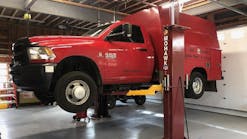10 things a great shop owner does every day
Content brought to you by Motor Age. To subscribe, click here.
What you will learn:
• Tips to become a better shop owner
• Team success means investing in your staff
• Having a passion for success will propel you toward your goals
As a shop owner, you’re no stranger to long hours and hard work. Some days are more hectic than others, and important tasks can be left unfinished if the day gets overwhelming. Other shop owners have found doing these 10 tasks every day helps keep them focused.
1. Greet your employees when you get to work
Fostering a connection between you and your employees can create a healthy and happy work environment. When the people who work for you feel valued, they are much more likely to be productive, on time, and present during work. All it takes is a quick “good morning” to let your employees know you appreciate them. You can even take it one step further and ask them specific questions pertaining to their lives.
Lacee Cunningham, owner of Eureka Brake and Automotive, shares her take on this tip:
“When I arrive, I make a point to walk through the shop and say good morning to each staff member. Usually it's a simple, ‘Good morning,’ but sometimes I will stop and ask them about something specific that I know they are interested in or involved with, like how their weekend was, how their spouse is doing with their child starting kindergarten, or how they did in that recent frisbee golf tournament. I really enjoy getting to know them on a more personal level, even if it's just a few minutes at a time.”
2. Inspect your shop to make sure it meets your standards
Once you’ve arrived, take 10 to 15 minutes to take a walk around your shop. During this time, make sure everything is up to par with your standards. Are there tools lying around? Is there trash in your front desk area? Imagine yourself as a customer, would you be impressed by the shop’s appearance alone? Take note of what stands out to you, both the good and the bad.
Kareem Abouzeid, owner of Knockout Collision Repair Inc., says:
"I inspect each area of the business for cleanliness and organization." Every day, I am looking for ways to improve both the appearance and functionality of the shop.”
3. Check your progress toward your goals
Keep a list of your weekly, monthly, and yearly goals on hand. At some point during the day, take time to sit down and track your progress. See how close you are to hitting your numbers for the week. Track the sales, production, and income for the month.
Then, compare these to where you want to be at this point in the year. Does it look like you’re on track, or do you have to change some things to keep moving toward your goals?
“Accurate tracking of the key numbers is vital for this,” Abouzeid says.
4. Be passionate about your shop
When a shop owner loves their shop and is excited about what they do, it shows other people they’re passionate and hardworking. For your employees, it sets a positive expectation. When they see you putting in the effort to make your shop the best it can be, they will be filled with the same excitement. For your customers, it shows them they are going to a trustworthy shop committed to excellence. This will ensure your customer base returns and shares their positive experiences with their friends, gaining you clientele along the way.
5. Prioritize your day
Once you’re in your office, take a moment to see what you have on the calendar for the day. Then, make a list of your top priorities (what needs to get done first, and what can take a seat on the back burner). This will help you visualize your day and keep you on track. Days can get hectic, so having a physical reminder of what needs to be finished will help you follow through on those tasks.
6. Plan your schedule in advance
Every day brings new information and challenges. Planning your days in advance opens time for you to schedule solutions to any issues that may arise so make sure to check your calendar frequently. This also allows you to leave your business at a reasonable time each day.
“I schedule my weeks in advance and schedule specific times for personal meetings with staff, doing my own executive duties, holding private meetings with my DRIVE coach, and working with my bookkeeper," Abouzeid says. "I handle the other things that pop up in the cracks of time in-between."
7. Expand your network
Do you have a relationship with any fellow shop owners in your area? if you do, it can be an advantage to you. Together, you can learn about what works and what doesn’t in your area. Instead of viewing them as competitors, think of them as colleagues. You all want the same goal: To provide quality and trustworthy service to the members of your community.
8. Take time to coach your staff
Putting time and energy into training your staff allows them to grow under your supervision. When employees see a future at your company, they are more likely to commit to working for you long-term. Invest in your employees’ future, so they will be invested in the future of the shop, thus increasing productivity.
“I have put key people in place to manage areas of the business," Abouzeid says, speaking how he’s grown as an owner. "I have trained and coached them to the point they can oversee their responsibilities, so I just have to let them do their jobs. I used to give employees a job to handle by themselves without adequate coaching or training, then I’d end up mad when they couldn’t get it done. Now, I coach my folks whenever needed. I listen to and use their suggestions to create policies and procedures to solve problems.”
9. Trust your team and delegate tasks
One person can’t handle everything – and that’s okay. Trust your team to be able to take over the reins on certain tasks when necessary. Your top employee, shop manager, or co-owner can be given more responsibilities as needed. Once you’ve delegated tasks to the appropriate person, you can now focus on any large issues at hand. With more free time, you can also make room for thinking about the future and where you want your shop to go.
10. Look for diverse perspectives
When one is making important decisions, it’s important to seek advice from many different people, whether this is other shop owners, business owners within a different industry, or even one of your employees. It’s important to consider the unique perspectives other people with different experiences have. You can learn a lot by sitting down and listening to someone’s thoughts on important matters and hopefully avoid making any mistakes that they have in the past. This can apply to not only major decisions but also how the shop functions day to day.



